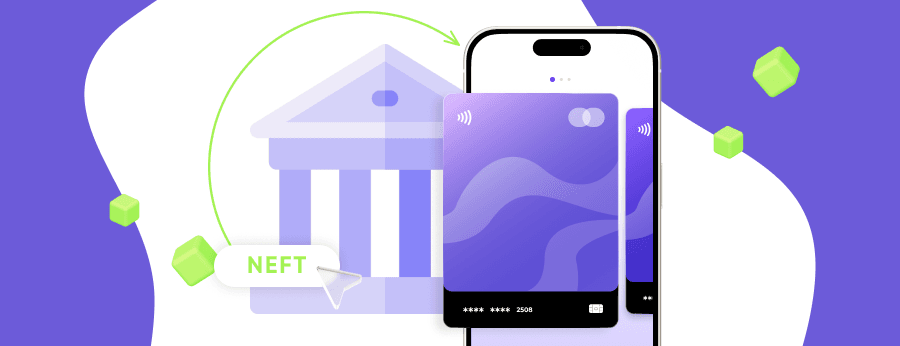The National Electronic Funds Transfer system in India allows individuals and businesses to send money digitally between bank accounts. The payments come and go through bank accounts throughout the whole country. Introduced in 2005 and managed by the RBI, this electronic transfer is a cornerstone of India’s digital banking.
Information regarding how much time NEFT takes is crucial for small business and corporate financial planning. Access to these schedules ensures that payments are completed in time. It allows effective cash flow management and helps to avoid potential delays. This information is also important for various startups that rely on fast transactions to establish trust with their clients.
NEFT Process Overview
The system facilitates the transfer of funds between savings accounts by individuals and companies in India. The payment system is in the form of a deferred settlement net. It settles transactions in half-hourly batches throughout the business day.
How Does This Electronic Transfer System Work?
To make a transfer, the sender provides the required information such as:
- The name of the beneficiary;
- The branch name of the beneficiary financial institution;
- The type of the beneficiary’s account;
- The bank name and account number;
- The IFSC code of the beneficiary branch.
For a comparison of this payment system with its closest rival IMPS, click this blog article:
On the NEFT, users can provide all details via an online banking website, mobile banking app, or an office. The sending bank debits the amount and includes the interest transaction in the subsequent batch.
Role of the Reserve Bank of India (RBI)
The RBI plays the main role in the NEFT system by serving as the central clearing house. It aggregates available transaction messages, consolidates them, and facilitates the settlement. The last is by debiting the balance and crediting the concerned bank account. This central control provides electronic fund transfers, without a cheque, throughout the country with security, efficiency, and reliability.
Discover Electronic Payment Settlement Timings

It is crucial for customers and businesses to be aware of how much time it takes for NEFT in order to conduct timely transactions. The system doesn't work live, there are time windows to process all of the transactions accumulated on the net. With the knowledge of the timing, users can make the transactions closer to the operation minutes.
Batch-Wise Processing
How much time does NEFT take? This system store is a batch processing system, with settlement taking place in batches at small intervals. It is available 24/7, including public holidays and Sundays, with transactions processed in 48 half-hourly batches throughout the day. But some may take an hour or two.
Cut-Off Timings and Transaction Limits
While online NEFT services are accessible around the clock, individual financial institutions may have specific cut-off Bank NEFT timings for branch-based transactions. The centre cut-off times typically range between 6:00 PM to 7:00 PM on weekdays and can be earlier on Saturdays. Therefore, it is important to have confirmation with your bank about the national system timings.
Working Hours, Weekends, and Holidays
The 24/7 availability of it implies that the transactions could be initiated at any second. However, for a user who prefers to carry out NEFT transactions at bank branches, it’s relevant to know that the services are available only during specific hours. Most branches operate from 8:00 AM to 7:00 PM on weekdays and from 8:00 AM to 6:45 PM on Saturdays.
On 2nd and 4th Saturdays, Sundays, and public holidays, bank branch brick-and-mortars may not be accessible, but online service can be available. Knowing how much time it takes for NEFT transfer helps customers plan their transfers more effectively. It allows them to send funds at the right moment without delays.
How Much Time Does NEFT Take?
Understanding how long NEFT transfer will take helps users plan their transfers better. Although it is secure, the settlement time and some other conditions are different. One needs to understand these facts for personal, commercial and business transactions. In the following, you will consider the average timing and the current factors that affect it.
Average NEFT Settlement Time
This system is a half to two hours on average, this scheme could vary. Unlike IMPS, which operates in real time and enables instant fund transfers. The national system processes transactions in pre-scheduled batches. If there is a transfer within active settlement hours, the beneficiary tends to receive the money on the same working day. After-hour transfers are pushed to the next available batch.
NEFT vs. RTGS and IMPS: Timing Compared
To better understand how much time money is transferred through NEFT, it’s useful to compare it with RTGS and IMPS:
- RTGS puts high-value transactions into separate categories and clears them immediately during banking hours.
- IMPS transfers funds instantly, regardless of weekends and holidays.
- NEFT operates on an hourly basis, weighing the pay rate against reliability for regular transactions.
Though the national payment system is not the fastest, it’s widely accessible and reliable because it is powered by the Central Bank of India.
Factors That Might Impact Transfer Time
A lot of users search for how much time it takes to transfer money through NEFT to plan their payments better. In most situations, this payment system completes the transactions on the same day, often within a half an hour. However, it’s recommended to avoid time-sensitive bill payments late in the business day to ensure prompt delivery. There may be slight delays due to bank network problems, maintenance plans, or holidays. Many financial institutions also stop internal crediting during late night shifts or idle hours. To avoid complete delays, users must ensure cut-off timetables and should not send funds near non-business hours.
Bank NEFT Timings

In 2025, all Indian financial institutions follow this payment system launched by the Reserve Bank of India. The processing windows and cut-off times vary. These differences depend on each bank’s internal systems and how they manage these transactions. Being aware of the differences helps users plan their actions and prevent delays.
Comparison of Electronic Transfer Timings Across Major Banks
Different financial institutions follow this system but operate on slightly different schedules. This comparison table highlights key details like availability, cut-off timings, and special notes. It enables users to transfer money at a minimum time.
Most private, public and family financial institutions now offer 24/7 electronic transfer services. But, the actual crediting of finance still occurs in batches.
Best Time to Initiate this Payment Transfers
For safe transfers, it’s best to initiate transfers during business hours. That is especially applicable for larger amounts or time-sensitive payments. The general real-time status can be tracked through the mobile application or internet banking portal. Some net banking displays the expected settlement slot for each client's convenience. That allows foreign customers to plan transfers accordingly.
Benefits of NEFT Transfer Over Other Payment Methods
Out of all digital payment options in India, it is still among the most popular. It is particularly for non-urgent payments that have to be secure and identifiable. Below, we explain why it is still a convenient entity to make payments this year.
NEFT: Trustworthy Mechanism for Day-to-Day Business Settlements
In the case of instant small and medium-sized transactions, the most logical answer is most likely a national electronic funds transfer. IMPS and RTGS are typically used for more high-value transactions, including ones in big capital management.
For regular payments like salary, rent payments, property taxes, supplier settlements, or subscriptions, it is a more suitable option.
What makes it even more suitable is the dependability of its smart batching system. Money transfer is processed in batches during the day. It’s available on all the maximum leading Indian banks. This offers extensive reach without needing additional apps or digital wallets.
Cost-Effective, Reliable, and Easy to Use
One of the best advantages of this system is how cheap it is. Most financial institutions offer free transfer charges, especially through mobile banking. This system processes payments in batches, unlike IMPS, which operates in real time. This is a key difference between IMPS and NEFT in terms of speed and availability with no disclosure. It means that businesses can handle dozens of per-month payments for no extra fees.
The direct process is also easy to integrate into standard accounting procedures. Either via phone banking or websites, it is standardized in its format with all banks, debit cards and gift cards. It offers a balanced mix of affordability, reach, and consistent care. That makes it a preferred option for many Indian businesses that value efficiency over speed and remittance without fees.
Summary of NEFT Transfer
Understanding how much time required for NEFT transfer is helpful in planning payments effectively. While the net operates 24x7, transactions are carried out in batches, and hence there may be slight delays. Timing will depend on the beneficiary bank terms, working hours, and holidays. For quicker outcomes, make transfers during business hours and not during weekends.
It is always better to check your bank NEFT timing before making premium payments. With settlement cycle awareness, customers can get a smoother, more predictable payment experience.
Online Payment Company #1
Online payment solutions for all types of businesses since 2019
Subscribe to stay updated
on industry news, insights, and exclusive offers


